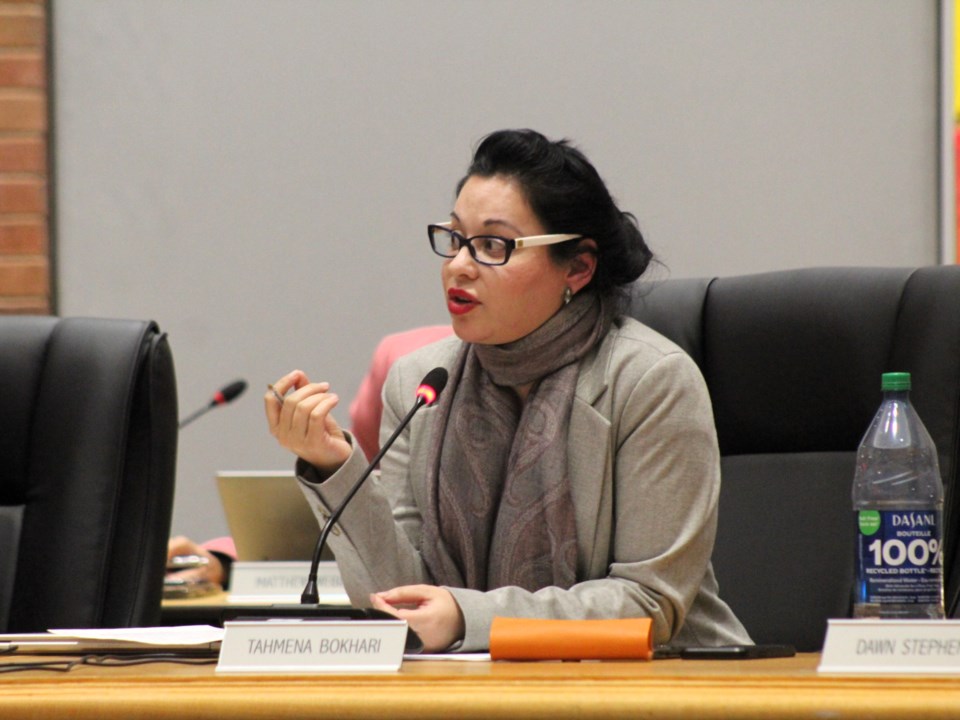Two years since it was initially formed, the Simcoe County District School Board’s human rights and equity office is currently “inundated” with complaints and concerns, a trend the office’s manager sees as a step in the right direction.
During the board’s regular meeting this week, the board’s human rights and equity manager Tahmena Bokhari provided a presentation to trustees on the office’s progress over the past two years, and the path forward for true equity across the board.
“There are changing demographics and newer issues,” she said, noting a specific example of prayer spaces being requested in Simcoe County schools for Muslim students. “There are microaggressions that maybe no one was called out on before, but now that we have a more diverse population, there are different perspectives.”
“When these offices are new, you do get an influx of complaints coming in. I’d rather have the problem of many people coming forward, than no one coming forward,” she said.
The SCDSB’s human rights and equity office was started in 2022 as an initiative through the ministry of education encouraging all Ontario school boards to have such an office.
The office works to educate on human rights issues, advises on changes to board policy and procedure from a human rights lens and offers a confidential reporting tool for students, parents or guardians to raise issues of discrimination, harassment and human rights violations within Simcoe County schools.
“Human rights cases are not really about intent. Most of the time, people don’t have intent to harm. It’s really about the impact,” said Bokhari. “When we look at cases, we’re looking at the balance of probabilities.”
Across Ontario schools, Bokhari explained that themes of racism, anti-Black racism, disability, Islamophobia, antisemitism and sexism are being seen.
“We’ve been seeing a rise in Islamophobia and antisemitism. We often see this when there are global events impacting our students and families locally,” said Bokhari.
While the conflict continues in Gaza, Bokhari didn't say whether that could be a contributing factor in the rise of Islamophobia and antisemitism.
However, to help address this specific issue, the office recently ran its first-ever dialogue session for parents of Muslim and Jewish students.
Bokhari spoke about viewing issues through a human rights lens, which helps shape understanding of who is disadvantaged and who is not, who is included and who is ignored, and whether a disparity is merely a difference or an actual injustice.
At school boards, Bokhari spoke about the streaming process – which has been discontinued – as an example of a systemic issue that disproportionately impacted Black students.
Bokhari said an equitable organization is not one where nothing ever goes wrong or there are never any violations.
“It’s really about whether the right processes get triggered when wrong things occur,” she said.
During trustee discussion, Barrie trustee Lynn Strachan asked if the human rights and equity office’s resources could be made more prominent on the SCDSB’s website.
“When people do have concerns or would like to make a complaint, it’s not overly clear on our website where you would do that,” said Strachan. “It’s not easy to find for the average person online.”
New Tecumseth trustee Sarah Beitz echoed Strachan’s concerns, and asked how behaviour is corrected.
“How do you determine if something is a human rights issue, or if it’s just kids being kids?” asked Beitz. “If there is an incident, how is that communicated to our families so we can all learn?”
Bokhari said her office looks at whether there are protected grounds in play, and whether the person bringing a complaint forward is a member of a protected class under the Ontario Human Rights Code.
“Once we see that, we do an investigation,” she said, noting that punishment is not the focus.
“The focus is on education and awareness. Our experience so far is when people know better, they do better. It’s about having the conversation.”
The SCDSB’s employment equity action plan is a five-year plan first adopted in 2022 following the board doing an equity audit that revealed insights, gaps and identified five key priority areas for the board to address to ensure that all employees are able to participate fully in the workforce, inclusive of race, religion, ethnicity, ability, gender, and all of the protected grounds under the Ontario Human Rights Code.
“The intent is to have corporate-wide impact,” said Bokhari. “We are talking about changing a culture across a very large board. We want this change to be sustainable that will last and have an impact on students and the community.”
“We’re early in our journey at the SCDSB.”
For more information on the SCDSB’s human rights and equity office or to submit a report, click here.



